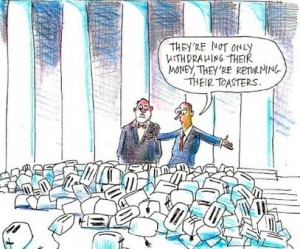Frank Keating, president and CEO of the American Banker’s Association: I constantly hear from hometown bankers that their examiners—the government officials who visit their banks every year to make sure they make safe loans and follow the rules—are recommending actions suited for banks many times their size. They call it “trickle-down regulation.”
Here’s an example: I recently heard from the CEO of a community bank with $1 billion in assets. His examiner urged him to conduct a “stress test” that is only required for banks with $10 billion or more in assets. On the one hand, a stress test is expensive and time-consuming to conduct—not to mention completely unnecessary for a hometown bank with a traditional business model. But on the other hand, if my friend rejects his examiner’s suggestion, he might risk getting a poor regulatory rating that could hurt his bank. In this context, the suggestion really isn’t a suggestion at all.
You may have a hard time getting worked up about the costs of trickle-down regulation on banks. That’s understandable, because it’s hard to see the costs of excessive regulation. Rules from Washington, D.C., don’t directly come with a price tag. But their cumulative weight requires banks to hire more staffers and consultants to understand and follow them—just as you might hire an accountant to help with your taxes if the IRS required you to pay at a higher bracket. These staff members don’t make loans or sell financial products that serve bank customers, but they often must be paid well because of their specialized expertise.
The result, according to researchers at the Federal Reserve Bank of Minneapolis, is that when a small hometown bank hires additional staff to follow extra regulations, that bank’s already-slim profits shrink by anywhere from 11 to 37 percent. Those shrinking profits have real-world consequences for the bank’s town and the people who live there: less lending for small businesses and entrepreneurs, fewer mortgage loans and fewer investments in the financial technologies of the future.
But beyond the shadow costs that trickle-down regulation imposes on everyday Americans is the basic unfairness of arbitrarily making people follow rules they’re not required to follow. You’d be furious if the DMV failed your daughter for not knowing how to drive an 18-wheeler, and you’d be steaming if the IRS charged you a tax rate for a higher bracket. Bank examiners shouldn’t be allowed to make up their own rules, either.

